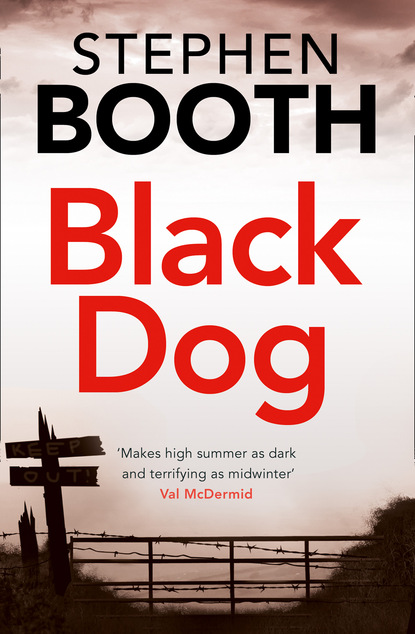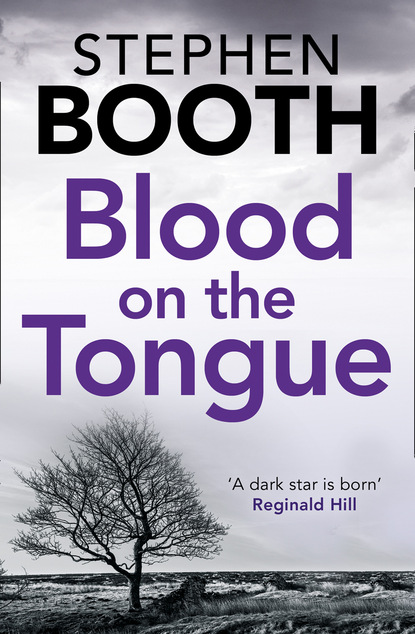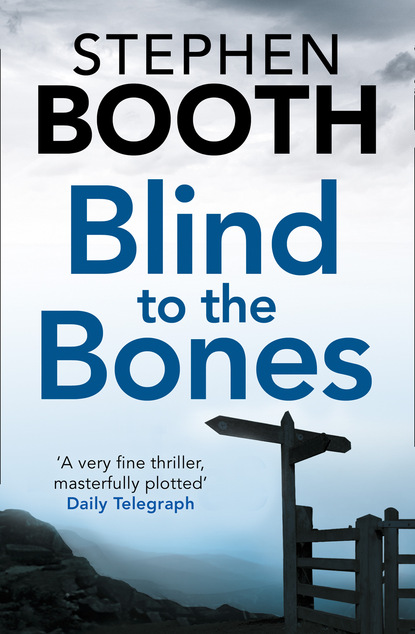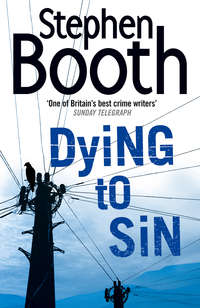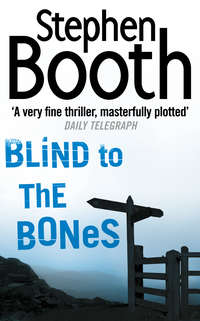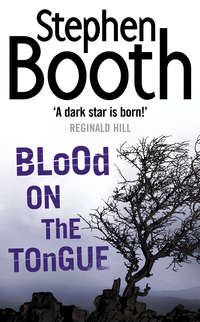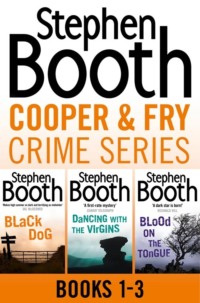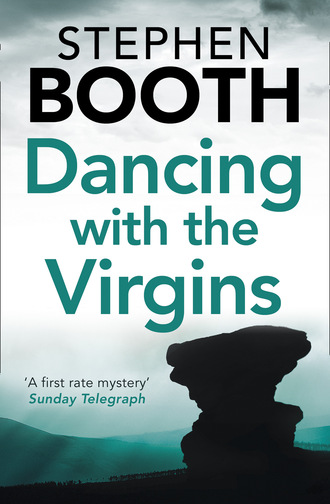
Полная версия
Dancing With the Virgins
‘Mr Fox?’
The Ranger turned, with a distracted air. Though Cooper was wearing his dark green waxed jacket over civilian clothes, he thought Owen would recognize him as a policeman. People always seemed able to tell. They said it was something to do with the look in your eyes.
‘Can I help?’
‘I’m Detective Constable Cooper. If you’ve got time, I’d like to call on your local knowledge.’
Cooper explained that he had been given the job of opening up access to the disused quarry and of securing the route for vehicles to get to the crime scene.
‘We need to see Warren Leach then,’ said Owen.
‘And he is …?’
‘Ringham Edge Farm. He owns most of the moor. The old quarry road runs across his land. We can go in the Land Rover, if you like.’
The farm was reached by a back road out of the village of Ringham Lees, an almost invisible turning by the corner of the Druid pub. A group of a dozen or so youngsters were hanging around in a bus shelter near the pub. When they saw the lights of the Land Rover coming, two teenage boys ran across the road directly in front of its bonnet and stood laughing and waving from the opposite pavement.
‘Some of these young people,’ said Owen. ‘Their common sense has left home before them. And it didn’t give a forwarding address.’
‘We get a lot like them in Edendale,’ said Cooper.
‘I bet you do.’
The Ranger had four radio sets in the cab of the Land Rover. The wide-band set under the dashboard was constantly scanning the channels for the Ranger Service and other local organizations. Another set was for the Mountain Rescue team. Behind the seats, fixed to a wire grille, were two battery-operated handsets on permanent charge for when they were needed. Cooper saw that there was also a satellite positioning device in a leather case. But the best-used piece of equipment seemed to be the vacuum flask. It was battered, but no doubt a welcome sight on a freezing day on the moors.
‘Some of this technology is all right,’ said Owen. ‘But we’ll be completely computerized one day. I only hope it’s after my time. I was brought up to think “online” meant your mum had just put the washing out.’
Cooper laughed. ‘Did you say this Leach owns the moor?’
‘Part of it. It’s all privately owned, one way or another. The PDNPA doesn’t own any land, you know. Being a national park doesn’t mean what people think it means.’
‘No, I know.’
‘But Ringham Moor is one of those places where the landowners have an access agreement with the national park, so Rangers are involved a lot. Especially with the attention the Nine Virgins get. They seem to have a special significance at the summer solstice – a bit like Stonehenge, you know? There can be two hundred or so people gathered up there – illegally, I might add, under the access agreement; not to mention the by-laws covering ancient monuments.’
‘But what do they get up to exactly?’
‘Oh, you wouldn’t believe it. Music, jugglers, camp fires. Children and dogs running round. It’s a bit like a medieval fair. One year we had to call in a mountain rescue team to carry off a young lady who’d been dancing from stone to stone, but fell off and broke her leg. Every year I pray it will rain – it keeps things quiet for a change.’
‘So much for the peace and quiet of the Peak District.’
‘Peace and quiet? One of our biggest jobs is looking after the safety of visitors. None of them have any common sense. If we left the fences off the old mine shafts, half of them would throw themselves in, thinking it was a new visitor experience.’
Owen Fox had a direct gaze and a sly smile in his eyes when he made a joke, though his face hardly moved. It took a bit of careful listening to understand when he was joking.
‘I wouldn’t want to work anywhere else, though,’ said Owen. ‘I’ve even picked the exact stone where I want my ashes to be scattered.’
They passed a large field containing a herd of black and white cattle and approached Ringham Edge Farm down a steep, narrow lane constricted between stone walls. The farm buildings were built mostly of the dark local gritstone, and the house itself had small, deeply-set windows that must let in little light. An extra shadow was thrown on the house by a large modern shed some distance from the track. Close to the shed stood the burnt-out shell of what looked like a Mitsubishi pick-up, the paint stripped from its bodywork and the interior of the cab blackened. Many farmers had the habit of letting all sorts of junk accumulate around their farm buildings.
Owen glanced at Cooper. ‘Would it be best if I talked to him?’
‘Leach? Is he likely to be difficult?’
‘He can be. He needs handling right. Sometimes you have to let people think they’re getting their own way.’
‘Even when they aren’t?’
‘Well. Sometimes. You do know, don’t you …’
‘What?’
‘It was Warren Leach’s wife Yvonne who found that other woman a few weeks ago.’
‘Of course – Maggie Crew.’
‘She got as far as one of the fields at Ringham Edge. Yvonne Leach came across her lying unconscious under a wall. Leach himself just reckoned it was a nuisance, I think. It kept him away from his work for a bit. But this old quarry road is mainly used as a footpath now. It’s a public right of way, and it runs right through the farm. When you have strangers walking past your door all the time, you can soon get to see them as an irritation. Some visitors think farmers are there as a public service, for providing toilets and telephones, or for pulling their cars out of ditches with their tractors. I can’t blame Warren – not really.’
When Owen Fox and Ben Cooper pulled up in the Land Rover, they found two boys in a brightly lit byre. They were fussing over a Jersey heifer calf with huge eyes and long black lashes. The animal stood patiently, twitching her damp nostrils with pleasure as she was brushed on each flank until her red coat gleamed. One of the boys reached out to stroke the calf’s muzzle, and she responded with a rasp of a plump tongue across his hand which made the boy smile with pleasure. Behind them, a wooden board was decorated with red and blue rosettes with long ribbons.
‘Is this the calf that won at Bakewell Show?’ asked Owen.
The boys looked uncertain what to say. Maybe they had been told not to talk to strangers, thought Cooper. But the Ranger wasn’t really a stranger, was he? He had been to the farm before; he knew Warren Leach. It was part of the Area Ranger’s job to maintain good relations with the farmers and landowners on his patch.
‘Yeah, this is her. She’s called Doll,’ said the older boy.
‘You’re Will, aren’t you?’ said Owen. ‘I can’t remember your brother’s name.’
‘He’s Dougie.’
Owen walked slowly towards the calf, hushing her quietly as she shied away and rolled her eyes at him. The boys held on to the halter nervously. But the animal calmed down when Owen began to talk to her, stroking her nose, gently following the lie of her coat along the side of her muzzle. He rubbed her shoulder to feel the firmness of the muscle and ran his hand down her spine. The calf relaxed under his touch.
‘She’s a beauty, lads. In superb condition. She’s a real credit to you.’
‘Thanks,’ said Will. Dougie appeared to be about to add something, but changed his mind.
Both boys seemed shy, but the younger one was particularly uncommunicative. Cooper wasn’t used to silent children. There were several kids of Will and Dougie’s age in his own family – nephews and nieces and second cousins. But none of them was so quiet. They were too noisy, if anything. These days, children were no longer seen and not heard. It was when you could neither see nor hear them that you began to worry, if you were a parent. That was when they were at risk.
But these two were different. They had a reticence about them, a watchfulness that bordered on hostility, as if they had learned to be afraid of visitors.
‘Will you be showing her again next year?’ asked Owen.
That seemed to have been the wrong thing to say. The boys’ faces fell, and Dougie looked as though he might cry.
‘Your dad will take you to the show, won’t he?’
Will shook his head. Now Cooper started to feel uncomfortable. ‘Where is your dad?’ he said.
‘Up at the workshop.’ Will pointed to the back of the house. The two boys looked relieved when they walked away and followed the roadway to a yard, where a metallic clanging came from a shed. Owen stuck his head through the doorway.
‘Warren? Good evening.’
Warren Leach looked up from a bench lit by a dim work-lamp. He was a man with almost no neck. His torso, thick and solid, without a single curve, erupted into bulging shoulders with trapezius muscles that almost reached the line of his jaw. He was wearing blue overalls, with a wide leather belt strapped round his waist.
‘Oh, it’s you,’ he said gruffly. ‘It never rains but it pours round here, does it? What do you want?’
‘Well, it might have been a friendly social call,’ said Owen.
Leach snorted. ‘Oh aye. Did you come past the shippon?’
‘We did.’
‘I suppose you saw those lads of mine. Are they still messing with that bloody animal?’
‘They look as though they’re doing a grand job with her, Warren. She’s in fine condition.’
‘Oh aye. Fine. And so she should be. The animal gets spoiled rotten. She’s fed better than any of us.’
The farmer was fiddling with a steel coupling pin from a trailer’s towing bracket. The pin trailed a short length of chain, which he swung irritably between his fingers.
‘What’s up now then, Ranger?’
‘Warren, the police need to get access for their vehicles up through here for a while.’
‘Oh?’
‘On account of the woman killed up there. You know about that.’
Leach shrugged. ‘It’s no business of mine.’
‘It’s your land, Warren,’ said Fox patiently.
‘Is it part of the access agreement then? Some tourist gets herself done in and I have to put up with this lot roaring backwards and forwards over my land like maniacs?’ Leach jabbed a finger in Cooper’s direction, effortlessly identifying him as what he was. ‘Well, it must have been in the small print, Ranger, because I missed it.’
‘Can you leave that top gate open for the police vehicles to get on to the moor, please?’
‘Leave it open? Why? They can open and close a gate like anyone else, can’t they? Or have coppers lost the use of their hands as well as their feet these days?’
‘It doesn’t do to make the police think you’re being obstructive,’ said Owen.
‘They can think what the hell they like.’
Cooper stayed silent, ignoring the aggressive glare. He was well used to it from the yobbos of Edendale. The only surprise was to see it in a middle-aged Dales farmer. But it was best to let Owen Fox deal with it – it was a chance for him to use his Ranger diplomacy.
‘I suppose I might just have a word with Yvonne then, before I go,’ said Owen.
‘What for? She’s got nothing to say to you.’
‘Just being polite.’
Leach grunted, and the chain tightened in his thick hands until the steel links squealed against each other.
‘It’ll mean I’ll have to move the cows down to the next field,’ he said.
‘Well, that’s no problem, is it?’
‘No problem? The grass is nearly finished in there. My milk yields’ll be gone to hell. They’re down already with all this disturbance.’
‘It’ll only be for a day or two, Warren.’
‘Would there be compensation, maybe? The police have got money. My money, from the Council Tax.’
‘I can’t imagine so. Think of it as a public service.’
Owen looked at Cooper, but Cooper just smiled.
‘Balls to that,’ said Leach.
‘Come on, Warren.’
Leach tossed the coupling pin into his other hand, slapping it against his palm. On a plastic drum, he had a square leather-bound case with steel clasps. Cooper wondered what it was. Somehow it didn’t look like a piece of farming equipment, more the sort of thing a doctor might carry his kit in for testing a patient’s blood pressure.
‘Only for a day or two, and that’s it,’ said Leach. ‘Tell your police friends they’ll have to get a move on. Let ’em work the same hours that I have to work to keep this farm going, instead of knocking off for tea every five minutes. I’ve seen it going on. I’m not stupid.’
‘Thank you, sir,’ said Cooper politely. But the farmer only glowered. ‘When would be convenient for an officer to come and talk to you?’
‘What?’
‘We need to take a statement from you. You’re well positioned here to be a witness.’
‘A witness to what? I went through all this with that other bloody woman that ended up on my land. I never saw this one either.’
‘Do you know who she was?’
‘Of course not.’
‘Then how do you know you didn’t see her?’ Cooper smiled. ‘Somebody will probably call tomorrow to see you.’
The two men began to walk back towards the Ranger’s Land Rover.
‘I’ll be back to see you soon, Warren,’ said Owen.
‘Don’t bother, Ranger. As soon as I see that red jacket of yours, I’ll be halfway to Bakewell.’
They almost ran right into Yvonne Leach in the gateway as they drove out of the yard. She was a small woman, with wide hips and strands of light brown hair tied loosely back from her face. Owen stopped the Land Rover, and the woman shied away, as nervous as a sheep, rolling her eyes at the vehicle. But she couldn’t slip past quickly enough.
Owen wound down the window. ‘Yvonne – all right?’
‘Yes.’
‘We’ve just had a word with Warren. I wanted to tell you not to worry about what happened up there. There are plenty of police about here. You’ll be OK.’
‘I’m not worried,’ said Yvonne, though to Cooper’s eye she looked as scared as any woman he had ever seen.
Warren Leach’s angry bellow came from the yard. ‘Hey, what do you think you’re doing? Get in the house.’ They looked round and saw him glaring at Yvonne. She took the chance of sliding along the side of the Land Rover and scuttling round the corner.
Owen drove on up the track. They had to open two gates to get any further, and the Ranger took it slowly to avoid alarming the cows.
‘Marriage,’ he said, after a minute.
‘What about it?’ said Cooper.
‘The most bizarre thing ever invented, in my opinion. You must see what I mean, in your job. Couples tied together for no apparent reason, making each other’s lives a misery. Isn’t marriage one of the major factors in crime? Domestics, you call them. Aren’t ninety per cent of murders committed by the spouse?’
‘Something like that.’
‘Well, I rest my case. Weddings ought to be banned, along with other blood sports.’
‘I thought the police were cynical, but I don’t think I’ve reached your stage, yet,’ said Cooper.
Then Owen looked at Cooper sideways and waggled his eyebrows. ‘I can see you’re not married yourself. You don’t have that harassed look. You weren’t thinking about it, by any chance, were you?’
‘Well …’ Cooper considered the answer for a moment. ‘I suppose it’s kind of the way I see my life going, some day.’
‘Mmm. Well, close your eyes or look the other way, then.’
The Ranger pulled the Land Rover on to a flat area of bare earth under a stand of beech trees. They were about two hundred feet further up towards the moor, looking down on the farm buildings and the fields around them. Beyond the farm was the village of Ringham Lees, its lights just visible in the trees in the valley bottom; and further away in the darkness, almost hidden by a spur of hill, were the spires of the two churches in the bigger village of Cargreave.
‘Tell your lot they can park here,’ said Owen. ‘The Virgins are just over the rise. That way to the right leads into Top Quarry. Just ask if you want anything else. They say I’m the man who knows these parts.’
Cooper found the cab of the Land Rover was comfortable and warm, full of things that had a practical use, yet without the slightest conscious attempt at imposing the driver’s personality.
‘Do you live locally, Owen?’ he asked.
‘I’ve got a house over there in Cargreave.’
‘I take it you’re not married either?’
‘Me? You must be joking. I may not be Einstein, but I’m not that stupid.’
‘A bad experience?’
‘Other people’s experiences are enough for me, mate. I’ve watched them all go the same way. Those young lads that you meet, full of enthusiasm and vitality, all their lives in front of them. And what happens? A wife and a mortgage. Before you know it, they’re coming into work half-asleep because the new baby’s kept them awake all night, and then they’re moving house to make room for all the family. In the end, they have to get a new job that they hate, just so that they can pay for it all. It’s like getting a life sentence without having the pleasure of committing the crime, the poor sods. Not for me. There’s just me and the cats, since Mother died.’
‘Was that recently?’ asked Cooper. The loss of his own father was recent enough to make him curious about someone else’s experience of the death of a parent.
‘It was a year ago. She was very old, of course. And she never feared death, that was a consolation. I used to take her to church until she couldn’t get there any more. But she could see the church tower from her bedroom, and that seemed to be enough at the end.’
‘And your father?’
‘Oh, he’s been gone a long time.’
‘Don’t you find that losing a parent makes the one that’s left seem very precious?’ said Cooper.
Owen looked at him cautiously. ‘Yes, you’re right. Actually, I think I might have worked with your father a time or two.’
‘Yes,’ said Cooper. ‘I’m sure you did.’
After a moment’s silence, Owen chuckled into his beard. ‘No, I’m on my own. I’m a happy bachelor. Young, free and single, that’s me. Well … two out of three’s not bad. Nobody’s really free.’
Cooper nodded. But he wasn’t thinking about Owen Fox. He was thinking of Yvonne Leach and the two boys he had seen at Ringham Edge Farm. It was one thing to live a life restricted by obligations, in the way that Owen described. But it was another thing altogether when it was fear that ruled your life.
And Cooper’s instincts told him that what he had seen at the farm was exactly that. It might be superficially concealed from the outside world, but it was bubbling very close to the surface. The Leaches were people whose lives were ruled by fear.
5
Since Diane Fry had arrived, the woman had kept her face turned away towards the window. The light from the desk lamp fell only on her left side, outlining her profile, delineating a high cheekbone and a straight nose. It highlighted the gold in a strand of hair tucked behind her ear, and it threw unmerciful shadows on the fine lines etched into the skin of her neck.
The apartment she lived in was austere, with minimal modern furniture, scrupulously clean, and cold, harsh lighting that created stark lines between light and shade. It was as if the rooms had been designed so that someone moving around in their cool spaces could know precisely where the shadows fell, where details were distinct and where they were not. Fry pictured the woman rehearsing her positioning in these rooms like an actress walking about a stage, seeking the best angle, presenting her most favourable side to the audience. On the other hand, perhaps she moved through the shadows by instinct alone – the instinct of a wounded animal. Because there was no mirror in this room to examine the effect in. No mirror, but a pale patch on the wall where one had once hung.
Maggie Crew sat behind a desk, as if conducting a formal interview with a client. On the desk, there were only a few items – a telephone, an ashtray, a paper knife. Along the side wall were a couple of shelves of law books and journals and a stereo system, finished in matt black, with neat racks of CD cases, their titles too small for Fry to make out.
Behind Maggie was a big sash window looking out over the roofs of Matlock. It had a view down the Derwent Valley to the point where it narrowed into a high gorge, with a hill above it that had been hacked and blasted into pieces by quarrying. Heavy green drapes hung from a brass rail over the window, capable of shutting out the natural light entirely during the day. Apart from that, there was little ornamentation in the room. The furnishings spoke to Fry of pretension without showiness, a subtle statement of the owner’s disregard for the comfort of her surroundings. According to the reports, Crew spent all her time in this apartment now, shut away from the world. It wasn’t difficult to understand why. She had been an attractive woman once.
‘My name is Diane Fry, Maggie.’
Maggie nodded. She wore a man’s Calvin Klein cube-design watch, all minimalist straight lines. A pad of A4 ruled paper lay near her hand, with a silver ballpoint pen. But she made no move to write down Fry’s name.
‘I’ve been asked to work with you for a while, Maggie. If that’s all right with you, of course.’
‘You know I’ve already agreed to this. Although I don’t know what good it will do.’
‘I want to go through with you again anything you can remember. Any little detail may help us.’
Where you might have expected Maggie Crew to have let her hair grow long to cover the disfigurement, it was cut short, trimmed clear of her forehead. The left side of her face was smooth and white, her cheeks like the skin of someone who had spent too long in the dark. Her hands, too, were pale, the backs of them flat and shapeless. Fry wondered if Maggie was a woman who struggled against gaining weight. But she was not fat now. Her cheekbones were visible in her face, her shoulders were prominent under the fabric of a black jacket. Fry herself liked to wear black. But on Maggie it seemed to be more than practicality or an attempt to make herself look slimmer; more, even, than a fashion statement. There was an emotion in the blackness, a dark outer show to match her feelings, to fit the atmosphere of the room. It was a sort of mourning.
‘What happened to the last one?’ said Maggie.
‘We just thought a change of personnel might help. A new approach …’
‘A fresh face.’ Maggie smiled. She had small, white teeth, but her upper lip drew back a fraction too far, exposing a strip of pink gum and removing the humour from her smile.
‘So.’ She stared at Fry, measuring her like a potential employee, a candidate for a domestic’s job. ‘Diane Fry. What is different about you, then?’
‘There’s nothing different about me. I’m just here to talk to you.’
‘Do you know how many people have said that?’
‘It’s all in your file,’ said Fry. ‘I know your history.’
‘Ah, yes. You’ve read my file. So you have the advantage of coming here knowing absolutely everything about me. How helpful that must be. Perhaps you think you know more about me than I do myself. Perhaps you think you know how my mind is working, exactly how you might manipulate my subconscious?’
‘Nobody wants to manipulate you, Maggie.’
‘Then what do you want? What is it you all want with me? Don’t you know by now that I can’t give it to you? Isn’t that in my file?’
‘If we keep trying –’
‘You think you might be able to make me remember. Then what? My memories might be able to help you, yes. But what will they do to me? What if I don’t want to remember? What if my subconscious has wiped out the memories?’
‘Do you think that’s the case?’
‘The doctors say there is no physiological reason for the memory loss. There is no damage to my brain. They tell me it’s probably shock; they call it trauma. They say it’s a safety device, which shuts down memories that the brain doesn’t want. Wipes them out.’
Fry watched her, trying to hide the scepticism in her face. She heard the words, and recognized some of the phrases from the medical reports. But she didn’t believe that you could wipe out memories completely, no matter how unpleasant. They left their traces everywhere, in the overlooked corners of your mind, and in the sensations of your body – the touch of your skin against your clothes, the sudden devastating echo in a sound, or the malignant resonance of a smell. Memories were cancerous growths, secretive and spiteful; sometimes you didn’t know they were there until it was too late. Diane Fry knew all about memories.


